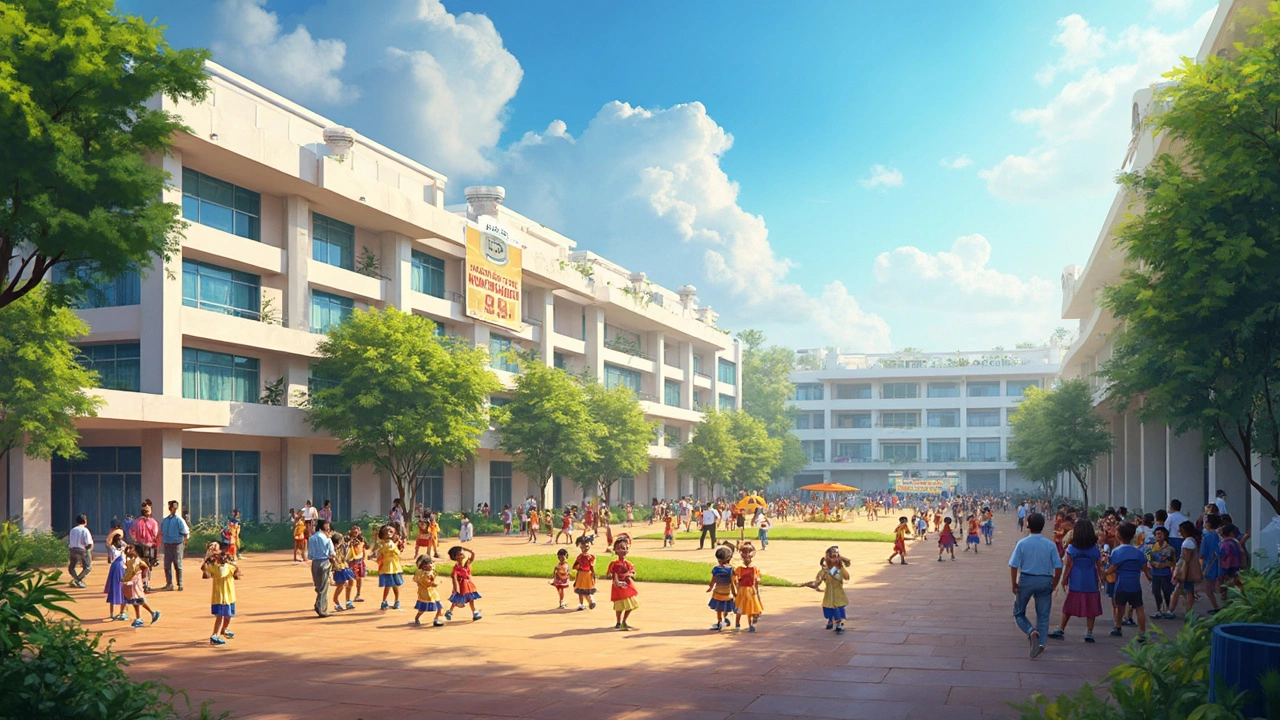Which State Has More CBSE Schools in India?
 Apr, 13 2025
Apr, 13 2025
India's education system is a vast landscape, with CBSE schools leading the way for many families seeking quality education. If you're curious about where these schools are predominantly located, you're not alone. Folks often wonder which state stands out with the highest number of CBSE schools. Believe it or not, Uttar Pradesh takes the crown. With its large population and emphasis on accessible education, it's no surprise that UP leads the pack.
But how did we get here? Several factors play into this, including population growth, urbanization, and educational policies. As cities like Lucknow and Allahabad expand, so do their educational infrastructures, making way for more CBSE schools. This growth isn't just about numbers; it's about meeting the educational demands of a rising young population.
- Understanding CBSE Schools
- Top State with Most CBSE Schools
- Factors Influencing the Numbers
- Spotlight on Leading Cities
- Choosing the Right CBSE School
- Future Trends in CBSE Education
Understanding CBSE Schools
Ever wondered what makes CBSE schools so popular in India? The Central Board of Secondary Education, or CBSE, is one of the most prestigious educational boards in the country, known for its consistent curriculum and focus on holistic development. It's not just about academics; they’re keen on shaping well-rounded individuals prepared for real-world challenges.
CBSE's syllabus is structured to promote analytical thinking and to break away from rote learning. That’s why many students find it more engaging and less tedious than some other boards. Plus, it's widely recognized across India, making transitions between cities a bit easier for families who move around.
You've probably seen CBSE making headlines for setting benchmarks in education quality. As Dr. Swati Popli, an education expert, puts it:
"CBSE's rigorous curriculum and consistent guidelines have set its schools apart, ensuring students are equipped for both national and global challenges."
CBSE schools follow a continuous and comprehensive evaluation system, which plays a key role in assessing students throughout the year rather than just at the end. This approach can lessen exam stress and allow students to showcase their talents beyond traditional subjects.
It’s not just academics though. Plenty of CBSE schools encourage extracurricular activities, from debating to drama clubs, giving students a chance to flourish outside the classroom. All these aspects make CBSE schools a top choice for many parents across the country.
Top State with Most CBSE Schools
If you're looking into where CBSE schools thrive the most in India, look no further than Uttar Pradesh. This state isn't just a historical gem; it's also home to the largest number of CBSE-affiliated schools in the country. Quite a combo, right? But how did UP earn this top spot?
One of the big reasons behind this is its sheer size—both in terms of area and population. With over 200 million people, there's a massive demand for quality education options. CBSE schools are popping up across the state to meet this need, especially as more families prefer the structured and standardized curriculum they offer.
Here's something else worth considering: Uttar Pradesh isn't just about numbers. Cities like Lucknow, Kanpur, and Varanasi have become educational hubs over the years. They offer not just quantity but quality too. The focus on building competitive environments means schools strive to improve constantly.
Want to see some impressive figures? Check out this table highlighting the number of schools in some of UP's leading cities:
| City | Number of CBSE Schools |
|---|---|
| Lucknow | 320 |
| Kanpur | 185 |
| Varanasi | 150 |
So, if you're thinking about relocating for better educational opportunities, or you simply find yourself curious, Uttar Pradesh is definitely a state to keep an eye on. It's a fascinating mix of tradition and educational advancement. This demand for CBSE education is only expected to grow, pushing schools to maintain high standards and continue expanding to reach more students.
Factors Influencing the Numbers
Ever wondered why some states, like Uttar Pradesh, have more CBSE schools? It's more than just chance; there are several factors at play. First off, population density is a biggie. States with larger populations naturally need more schools to accommodate all those students. Shared family aspirations and societal values toward education also trickle into these numbers, pushing for more educational facilities.
Another key factor is urbanization. As cities grow, so does the demand for quality education. States that have rapid urban development often see a rise in CBSE schools. The story doesn't end with urban sprawl, though. State policies weigh heavily. Some state governments actively promote the establishment of CBSE schools to improve educational standards and offer parents more choices.
- Government Support: States offering incentives and easier licensing processes tend to attract more schools.
- Economic Factors: Economic stability and growth fuel the education sector, encouraging schools to flourish.
- Competition: The presence of other educational boards and private institutions can influence CBSE numbers.
Here's an example that might surprise you. Karnataka, another state with a significant number of CBSE schools, benefits from its tech-savvy population. With many parents in IT-related jobs, there's a strong preference for a CBSE curriculum that prioritizes science and technology skills. So, the rise in CBSE schools in such areas is partly driven by the industry's demands.

Spotlight on Leading Cities
Diving deeper into the heart of where education thrives, several key cities stand out in India for their abundance of CBSE schools. First up is Delhi, the capital city, which boasts a rich network of schools thanks to its unique blend of modernity and tradition. They host a multitude of CBSE institutions spread across various neighborhoods, catering to the educational needs of a diverse population.
Next, there's Bangalore, often hailed as the Silicon Valley of India. While it's renowned for its tech boom, the city hasn't skimped on education. CBSE schools in Bangalore are known for integrating cutting-edge technologies into their teaching methods, preparing students not just academically but also practically for the future.
Mumbai, the bustling coastal city, is another major player. Its fast-paced life is matched by a robust educational system, where CBSE schools play a pivotal role in crafting future leaders. Interestingly, Navi Mumbai, a planned satellite township, is witnessing rapid growth in CBSE institutions, balancing urban sprawl with educational development.
Chennai is the gateway to South India and a significant hub for CBSE schools. This city stands out for its emphasis on both traditional values and modern education techniques. Not only do schools here focus on academic excellence, but they also emphasize cultural vitality, which is essential for holistic development.
These cities are not just about numbers; they represent a commitment to delivering quality education, adapting to changing times, and addressing local needs. Maintaining a healthy balance between academics and extracurriculars, the schools here ensure students are well-rounded and ready to take on any challenge.
Choosing the Right CBSE School
Finding the perfect CBSE school for your child can feel like a daunting task, but breaking it down into manageable steps makes it easier. First things first, look at the school's accreditation. It's essential that the institution is officially affiliated with the CBSE board to ensure the curriculum meets national standards.
Location is pivotal. Consider schools that aren't too far from home or accessible without long commutes. More time traveling means less time for studies and play, and hey, kids deserve some downtime!
Another crucial aspect to investigate is the school's academic track record. Check how students perform in board exams and any other assessments. A good academic history can be a sign of quality education, capable teachers, and an effective learning environment.
Don’t forget the extra-curriculars. Yes, academic performance is crucial, but so are sports, arts, and other activities. They help in the holistic development of your child, and let’s face it, not everyone grows up to be a math whiz! Schools with a range of activities usually encourage kids to find and pursue their passions.
- Visit the school: If possible, take a tour. Nothing beats seeing the facilities and meeting the teachers face-to-face.
- Talk to other parents: Insights from other parents can be invaluable. They know what the day-to-day atmosphere is like and can offer firsthand experiences.
- Check the fees: Ensure the fee structure aligns with your budget. Quality education doesn’t always have to break the bank.
Remember, each kid is unique, so what works for one might not work for another. Equip yourself with all the facts and trust your gut. After all, you know your kid best and what environment will make them thrive!
Future Trends in CBSE Education
The landscape of CBSE schools in India is always evolving, and staying ahead of the game requires looking at the trends on the horizon. With the increasing emphasis on technology, many CBSE schools are adopting digital learning methodologies. This means more classrooms equipped with smart boards, and lessons accessible online.
An exciting development in CBSE education is the push for skill-based learning. The curriculum is slowly shifting from rote memorization to fostering critical thinking and problem-solving skills. This shift aims to make students more adaptable to real-world scenarios.
There’s also a stronger focus on mental health and well-being in schools. More institutions now incorporate programs that support emotional and psychological health, recognizing the importance of a balanced mind in academic success. According to a report from the Ministry of Human Resource Development, "The future of education will be more personalized, catering to individual student needs."
The future of education will be more personalized, catering to individual student needs.
Looking at numbers, there's an anticipated increase in CBSE school enrollments over the next five years. As urban and rural areas develop, demand for CBSE-affiliated schools continues to rise. This is a result of CBSE's reputation for robust educational standards and the flexible approach to learning.
For parents wondering how to navigate this evolving landscape, it’s crucial to keep an eye on school reviews and curriculum updates. Engage with other parents, visit schools, and participate in PTA meetings to stay informed. This hands-on approach can help in choosing the right institution for your child.